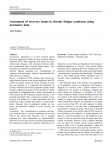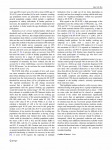Frank writes about his response here (in Dutch): http://www.hetalternatief.org/Herstel Twisk Objectiveren Symptomen 2014 1229.htmFrank Twisk had a letter published in reply. Here's the abstract (don't recall seeing an abstract for a letter before).
Here's a Google translation of it:
Twisk in response to Friedberg: recovery should be determined objectively
Quality of Life Research today published a letter from yours truly in response to an article by Friedberg and colleagues in which his proposals recovery measures based on the level of "fatigue" and the perception of the patient about "recovery".
The two main arguments against my letter to the editor: Distinguish between ME (including post-exertional "malaise") and CVS (non-ME). Make maximum use of tests that objectify symptoms to diagnose instead ask lists and subjective concepts such as "fatigue".
Witness their response are Friedberg (behavioral, president IACFS-ME ) and his colleagues department of psychiatry and behavioral sciences at Stony Brook University does not agree.
Authors' response to commentary by Twisk Qual Life Res. Jun 17, 2014 doi:. 10.1007/s11136-014-0738-0. Adamowicz JL, Caikauskaite I, Friedberg F. The response of Friedberg and colleagues can be summarized as follows:
My argument would result from a biomedical explanatory model for ME and CFS.
FT: The objectification of symptoms is totally independent of the cause (s) k (and) ME and CFS.
The double cycling test ( click here and here ) would be costly and a (too) heavy burden for patients.
FT: The latter is certainly true, but apparently necessary to convince unbelievers. To the extent that patients, their gums to be, it is better than heavy exertion be with incomprehension, denial, nonsense treatments and loss of income. faced The argument that the double bike test is expensive and time consuming, in my view, utterly nonsense.
The sensitivity and specificity of the double bike tests are insufficiently known.
FT: In a study of VanNess and colleagues, patients and "inactive" could very accurate (95.1%) can be distinguished on the basis of the (worse) results in the second test cycle. Several studies have shown that healthy and inactive people and patients with other diseases hardly not even go backward or forward in the second cycle test (difference within ± 7%).
Friedberg and colleagues prefer a "transdiagnostic model" (?, FT) based on their eyes "normal" conceptions of recovery.
FT: According to a study by Button and colleagues "recovered" 69% of patients using CBT / GET of "fatigue", while in terms of "activity" ( click here ) hardly changed anything. According to the evaluation of the reference centers from 2006 patients go into objective standards (maximum oxygen uptake) on ahead, while employment declined an average of 6%. According to a study by Bell to the degree of "restoration" of patients 25 years later people, although the vague label "CFS" lost, but in severity of symptoms and "restrictions" there is hardly any difference between those who "recovered from CFS."
According to Friedberg and colleagues, there are absolutely no tests to objectify symptoms and its symptoms, although subjective, not least for the "degree of recovery."
FT: That last I do not pretend that only "recovery" / "improvement" often means little lens.
This tests to objectify missing symptoms in my opinion is totally incorrect ( click here ).


